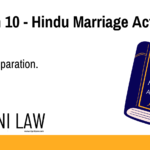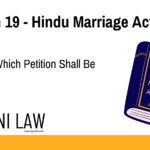Code:
(1) Notwithstanding that a marriage is null and void under section 11, any child of such marriage who would have been legitimate if the marriage had been valid, shall be legitimate, whether such child is born before or after the commencement of the Marriage Laws (Amendment) Act, 1976 (68 of 1976), and whether or not a decree of nullity is granted in respect of that marriage under this Act and whether or not the marriage is held to be void otherwise than on a petition under this Act.
(2) Where a decree of nullity is granted in respect of a voidable marriage under section 12, any child begotten or conceived before the decree is made, who would have been the legitimate child of the parties to the marriage if at the date of the decree it had been dissolved instead of being annulled, shall be deemed to be their legitimate child notwithstanding the decree of nullity.
(3) Nothing contained in sub-section (1) or sub-section (2) shall be construed as conferring upon any child of a marriage which is null and void or which is annulled by a decree of nullity under section 12, any rights in or to the property of any person, other than the parents, in any case where, but for the passing of this Act, such child would have been incapable of possessing or acquiring any such rights by reason of his not being the legitimate child of his parents.
Explanation:
This section deals with the legitimacy of children born from marriages that are later declared null and void (void marriages) or annulled (voidable marriages) under the Hindu Marriage Act. It aims to protect the interests of children born from such marriages, ensuring their legitimacy and inheritance rights.
Sub-sections:
- Sub-section (1):This subsection states that any child born from a marriage that is null and void under Section 11 of the Act (void marriages) is considered legitimate. This legitimacy applies irrespective of the child’s birth date (before or after the commencement of the Marriage Laws (Amendment) Act, 1976), even if a decree of nullity is granted or the marriage is deemed void through other means.
- Sub-section (2):This subsection addresses voidable marriages (Section 12). It declares that any child conceived or born before the granting of a decree of nullity is considered legitimate, as if the marriage was dissolved instead of annulled.
- Sub-section (3):This subsection clarifies that the legitimacy granted by subsections (1) and (2) does not automatically grant the child any inheritance rights in the property of individuals other than their parents. This safeguards the property rights of third parties.
Illustration:
A couple enters into a marriage that is later declared null and void because they were related within the prohibited degrees. They have a child during the marriage. Even though the marriage was void, Section 16(1) would consider their child as legitimate, ensuring their inheritance rights from the parents.
Common Questions and Answers:
Q: Does Section 16 apply only to marriages declared null and void under the Hindu Marriage Act?
A: No, it also covers marriages that are deemed void due to other legal grounds.
Q: What about children born after a marriage is declared null and void?
A: Section 16(1) grants legitimacy to any child born before or after the marriage is declared void.
Q: Can the child inherit property from the grandparents in this situation?
A: Section 16(3) clarifies that while the child is legitimate, they do not automatically inherit property from anyone other than their parents.
Conclusion
Section 16 of the Hindu Marriage Act provides critical legal protection to children born from void and voidable marriages. By granting them legitimacy, the law ensures that such children are not punished for circumstances beyond their control. While it does not give them full inheritance rights to ancestral or joint family property, it does secure their rights with respect to the parents’ individual or self-acquired property. This provision reflects the progressive intention of the law to uphold the welfare and dignity of all children, regardless of their parents’ marital status.
For more expert insights on family and matrimonial law, explore ApniLaw.










